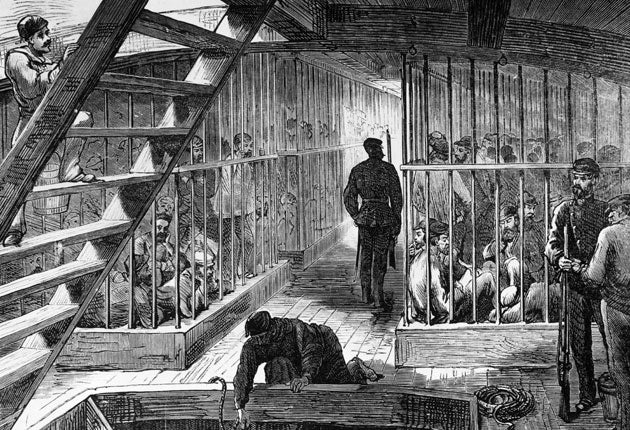Website reveals secrets of convicts sent to Australia
Detailed records are now available of thousands of Britons transported in the 18th and 19th centuries

Your support helps us to tell the story
From reproductive rights to climate change to Big Tech, The Independent is on the ground when the story is developing. Whether it's investigating the financials of Elon Musk's pro-Trump PAC or producing our latest documentary, 'The A Word', which shines a light on the American women fighting for reproductive rights, we know how important it is to parse out the facts from the messaging.
At such a critical moment in US history, we need reporters on the ground. Your donation allows us to keep sending journalists to speak to both sides of the story.
The Independent is trusted by Americans across the entire political spectrum. And unlike many other quality news outlets, we choose not to lock Americans out of our reporting and analysis with paywalls. We believe quality journalism should be available to everyone, paid for by those who can afford it.
Your support makes all the difference.When the Napoleonic war veteran Warren Kerr was caught stealing from his MP, justice was brief and brutal: he was sentenced to death. Luckily for him, his life was spared. Unluckily, along with thousands of other convicts, he was sentenced to the next worst thing: deportation to Australia.
Kerr's story is one of 55,000 posted on the internet today detailing the fate of thousands of British convicts sentenced to transportation. An ancestry website outlines how Kerr was convicted of stealing from Samuel Thornton, MP for Hull, in 1815. A trial at London's Old Bailey heard that he had stolen rings and watches from Thornton's London home while working there. The death sentence was later commuted and Kerr, a decorator, was transported by convict ship to New South Wales.
One in three Britons have a convict ancestor, according to Ancestry.co.uk, which is publishing the records to coincide with Australia Day on Tuesday. Details on the website of those who were deported include their crime, trial, the name of the ship, physical description and occupation.
The records, part of a four-year project to make details of more than two million deportees available, feature the Convict Registers of Conditional and Absolute Pardons, 1791-1846, and the New South Wales Certificates of Freedom, 1827-1867, given to convicts in the colony.
They give vivid first-hand accounts of how Australia became the politically expedient safety valve for Britain's overpopulated jails. These were fit to burst after American colonies slammed the door on British deportees after the American War of Independence in 1776.
In 1787, the first 11 ships carrying convicts to Australia – known as the First Fleet – set sail for New South Wales, arriving eight months later.
Among the thousands of convicts detailed in the collection were a number of infamous criminals who would change their ways dramatically in their new homeland. Joseph Backler, a British artist who was sentenced to death for forging cheques in 1831, had his sentence commuted to transportation. Continuing to paint after receiving a conditional pardon in 1847, he is today regarded as the most prolific oil painter of early colonial Australia.
Sadly, it appears not to have had such a salutary effect on Warren Kerr's life or fortunes. Not long after being sent to New South Wales on board the Elizabeth he was sentenced to the lash for stealing timber from a government yard. In 1824, after setting up business with his wife, he was convicted of handling stolen goods. Records reveal that his son, Warren Jnr, was also convicted of theft. Warren Snr eventually earned a conditional pardon in 1848 only to die five years later at the Benevolent Asylum in Sydney.
"He had quite an unfortunate life, this chap," said Charlotte Samiec, Kerr's great-great-great-great granddaughter, from Mildenhall, Suffolk, who researched his life using UK and Australian archives and hopes to fill some blanks using the material that becomes available today. "He had been in front of the judge a couple of times. He'd previously stolen some boot-tops, and was thrown in jail for six months, but stealing from Samuel Thornton, MP for Kingston-upon-Hull, was to be his downfall."
Join our commenting forum
Join thought-provoking conversations, follow other Independent readers and see their replies
Comments